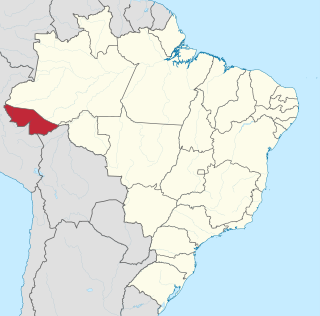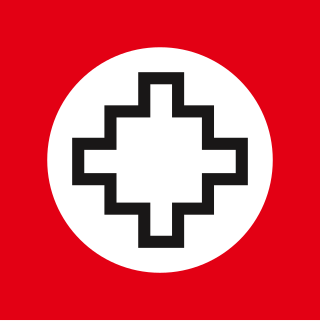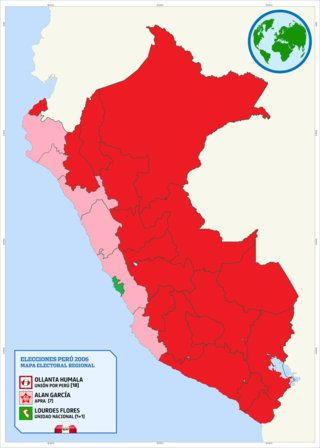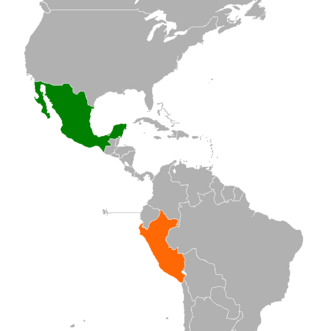Related Research Articles

Acre is a state located in the west of the North Region of Brazil and the Amazonia Legal. Located in the westernmost part of the country, at a two-hour time difference from Brasília, Acre is bordered clockwise by the Brazilian states of Amazonas and Rondônia to the north and east, the Bolivian department of Pando to the southeast, and the Peruvian regions of Madre de Dios, Ucayali and Loreto to the south and west. The state, which has 0.42% of the Brazilian population, generates 0.2% of the Brazilian GDP.

Alan Gabriel Ludwig García Pérez was a Peruvian politician who served as President of Peru for two non-consecutive terms from 1985 to 1990 and from 2006 to 2011. He was the second leader of the Peruvian Aprista Party and to date the only party member ever to have served as President. Mentored by the founder of the APRA, Víctor Raúl Haya de la Torre, he served in the Constituent Assembly of 1978–1979. Elected to the Peruvian Congress in 1980, he rose to the position of General Secretary of the APRA in 1982, and was subsequently elected to the presidency in 1985 in a landslide victory at the age of 35 years.

Antauro Igor Humala Tasso is a Peruvian ethnocacerist, a former army major, and nationalist leader.

The Ethnocacerist movement is a Peruvian ethnic nationalist movement that espouses an ideology called ethnocacerism. The movement seeks to establish a proletarian dictatorship led by the country's Indigenous communities and their descendants. It draws on the ideas and history of Indigenous and anticolonial movements, including those of Juan Velasco Alvarado, Evo Morales, Abdel Nasser, Muammar Gaddafi, and Che Guevara. Ethnocacerism is considered an Indigenist ideology and is currently represented in mainstream politics by the Union for Peru party and other smaller parties. The ideology is followed by Peruvian militant groups like Asociación Plurinacional de Reservistas del Tahuantinsuyo and Ejército de Reservistas Andino Amazónico – T.

The Trans-Andean railways provide rail transport over the Andes. Several are either planned, built, defunct, or waiting to be restored. They are listed here in order from north to south.

Ilo is a port city in southern Peru, with 66,118 inhabitants. It is the second largest city in the Moquegua Region and capital of the Ilo Province.

General elections were held in Peru in on 9 April 2006 to elect the President, two Vice-Presidents, 120 members of Congress and five members of the Andean Parliament for the 2006–2011 period. As the no presidential candidate received a majority of the vote, a second round was held on 4 June between the top two candidates, Ollanta Humala and Alan García. Garcia won the run-off with 52.63% to Humala's 47.37%. He was subsequently inaugurated on 28 July 2006, Peruvian Independence Day.

The foreign policy of the Hugo Chávez administration concerns the policy initiatives made by Venezuela under its former President, Hugo Chávez, towards other states. Chávez's foreign policy may be roughly divided into that concerned with United States-Venezuela relations and that concerned with Venezuela's relations with other states, particularly those in Latin America and developing countries on other continents. In many respects the policies of the Chávez government were substantially different from the previous administrations that governed Venezuela.
Isaac Humala Núñez is a labour lawyer from Ayacucho and the ideological leader of the Movimiento Etnocacerista, a group of ethnic nationalists in Peru.

Lieutenant colonel Ollanta Moisés Humala Tasso is a Peruvian politician and former military officer who served as President of Peru from 2011 to 2016. Originally a socialist and left-wing nationalist, he is considered to have shifted towards neoliberalism and the political centre during his presidency.
Odebrecht S.A., officially known as Novonor, is a Brazilian conglomerate, headquartered in Salvador, Bahia, Brazil, consisting of diversified businesses in the fields of engineering, construction, chemicals and petrochemicals. The company was founded in 1944 in Salvador by Norberto Odebrecht, and is active in the Americas, the Caribbean, Africa, Europe and the Middle East. Its leading company is Norberto Odebrecht Construtora.

General elections were held in Peru on 10 April 2011 to elect the President, the Vice Presidents, 130 members of Congress and five members of the Andean Parliament. As no presidential candidate received a majority in the first round, a second round was held on 5 June to determine the successor of outgoing president Alan García. Former army officer Ollanta Humala narrowly defeated Keiko Fujimori, daughter of imprisoned former President Alberto Fujimori. Humala was sworn in as the 94th President of Peru on 28 July.

Canada–Peru relations refers to the current and historical relations between Canada and the Republic of Peru. Both nations are members of the Asia-Pacific Economic Cooperation, Cairns Group, Lima Group, Organization of American States and the United Nations.

Peru–Uruguay relations refers to the diplomatic relations between the Republic of Peru and the Oriental Republic of Uruguay. Both nations are members of the Cairns Group, Community of Latin American and Caribbean States, Group of 77, Latin American Integration Association, Organization of American States, Organization of Ibero-American States and the United Nations.

The foreign policy of the Ollanta Humala concerns the policy initiatives made towards other states by the former President of Peru, in difference to past, or future, Peruvian foreign policy as represented by his Foreign Minister Rafael Roncagliolo. Humala's foreign policy was based on relations with other states of the Americas.

Mexican-Peruvian relations are the historical and current bilateral relationship between the United Mexican States and the Republic of Peru. Both nations are members of the Asia-Pacific Economic Cooperation, Community of Latin American and Caribbean States, Lima Group, Organization of Ibero-American States, Organization of American States, Pacific Alliance and the United Nations.
The Trans-Amazonian Railway is a proposed transcontinental railroad megaproject that will link the Atlantic and Pacific Oceans via the Amazon Forest. It is estimated to cost $10 billion.

The Bioceanic Corridor is a road project between Brazil, Paraguay, Argentina and Chile. The project would join the port of Santos, Brazil on the coast of the Atlantic Ocean with the port of Iquique and Antofagasta, Chile, on the coast of the Pacific Ocean.
The Brazil–Peru Railway or Bi-Oceanic Railway is a proposed transcontinental railroad project that will link the Atlantic and Pacific Oceans via Bolivia. In 2017 it was estimated to cost € 12 billion.

Palestine–Peru relations are bilateral relations between the State of Palestine and Peru. Peru recognized Palestine as a sovereign state on 24 January 2011. Both nations are members of the Non-Aligned Movement. Palestine has an embassy in Lima.
References
- ↑ "Ollanta Humala se reunió con el presidente de China, Zhang Dejiang". RPP. 12 November 2014.
- ↑ "Realizarán estudios básicos para construcción de ferrocarril bioceánico Perú-Brasil". Andina. 19 November 2014.
- ↑ "Ollanta Humala: 'Tren bioceánico Perú-Brasil no pasará por Bolivia'". Perú21. 19 November 2014.